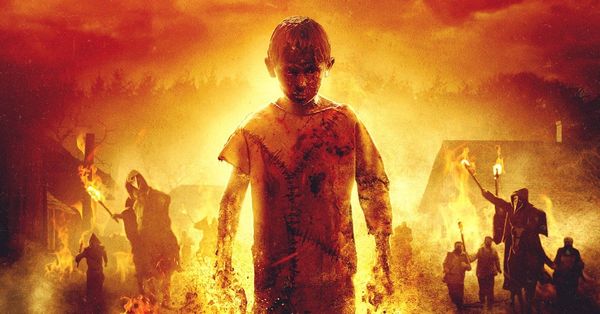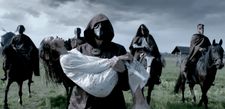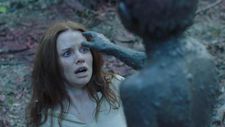 |
| Burning it down in The Golem |
Rewatching The Golem after what happened in Pittsburgh recently, it’s hard not to feel the additional weight of a film that explores anti-Semitism in a historical context, showing a woman creating a creature to defend her people. The woman has lost a child; she’s also frustrated at the lack of power she has because of attitudes to her gender, in a situation where her community needs all the skill and intelligence it can find – but there’s a warning here, too, about what can happen when responding to violence with violence, and about the difficulty of maintaining control once such forces are unleashed. This is the Paz brothers’ third feature and the second to reach international audiences, after the breakout success of Jeruzalem in 2015. They’re touring with the film but Doron Paz nevertheless found the time to connect and share his thoughts.
 |
| Outsiders distrust the plague-free Jewish community |
“The golem is a very ancient, well known mythology in Israel,” he begins. “It’s funny to say but we’re always persecuted in many kinds of ways. I think the golem legend is trying to answer this issue. The basis of the golem is like a Jewish Frankenstein or a Jewish superhero. It comes to defend the Jews. So when we started we were attracted to the idea of dealing with this subject. We like the dark side, you know? We like the edgy, dark angles of stuff, especially in Judaism and in other religions. So we started out with that but as we were working on the movie we realised it was much more contemporary than we thought.
“This deals with so many issues that are very up to date and you can read about it in the papers and, you know, the world is going through so many changes these days. You can really feel the changes in attitudes to foreigners. Every country goes inwards and is more nationalist. It seems like we found a good subject here, in a way.”
It also feels very contemporary because of its heroine, who is quite a modern figure despite the Medieval setting. Was it important to him and his brother, Yoav Paz, to centre the film on a woman?
“Yeah. Me and my brother, although we’re both men, we like dealing with female characters. it’s much more interesting, it’s much more complex... We liked the idea of dealing with a woman and the subject of creating life, carrying a baby and what it feels like to create life. That’s very good for us and for the golem mythology which also deals with creating life, just differently.
“We like the idea that Hanna, the protagonist, is a very strong female. If it was nowadays or if she was in a liberal world she could be like the best rabbi ever. She’s super smart and she could do whatever she wants but in this closed, repressive society, back then, she couldn’t do it. So she had to learn undercover and sneak into the synagogue to learn.
 |
| A mother sees her child for the first time |
“In Jeruzalem also we dealt with female characters and we love it. It’s much more interesting for us as filmmakers.”
It brings us back to Frankenstein, I suggest. In a way, this feels like a science fiction film – the community at its heart is persecuted because its understanding of hygiene means it’s not affected by the plague, leading to suspicion by outsiders and creating a problem which is then solved by the application of a Kabbalistic counterpart to science.
“This is a religious Frankenstein in a way, you’re right. It’s not like a scientific film but yeah, I think we [Jewish people] were so isolated so many times over the years, that’s what made us survive. So I think this mythology evolved over the years around this issue, that the village next door, the gentiles, the foreigners always try to kill us. Obviously the most famous golem story is the Maharal, the golem from Prague. But what stood out to us when we we were doing the research is that if you go to the books, if you go to the Kaballah, you can actually find a recipe for the golem. It’s written there: how to create a golem, which is amazing. You take soil and you take water and you take all kinds of stuff... and it’s written there: how to create life.”
So did they consider adding a notice to the film saying ‘don’t try this at home?’
He laughs. “Yeah! Actually it’s really funny. We’re not religious persons, me and my brother, but we worked with Ariel Cohen, the screenwriter, and the producer Shalom Eisenbach, and they really made us realise that this is not just a legend or something you want to play with as filmmakers, it’s all in the scriptures. It’s all there, much more deeper and profound than we thought.”
How did they find the right cast to bring their vision to life?
“It’s a funny story. We knew Hani Furstenberg, who’s an Israeli-American actress who’s been successful for years – we knew her name, we never worked with her – and we really thought she could do it and we invited her for an audition but she wasn’t in Israel. She lives in New York and we live in Israel, and she came to visit just for a week. It was very hectic so she didn’t have a lot of time to read the script and her agent told her ‘Yeah, it’s a horror movie.’ I think she never did a horror movie before and she thought, yeah, it’s another cliché horror movie, a slasher, and she didn’t understand exactly the tone of the movie.
 |
| The community is under threat |
“This movie is actually a dark drama, it’s not really a horror movie. It’s character-driven. Anyway she heard that it was a horror movie and we waited for her in the audition but she didn’t come. Eventually her agent called and said ‘She doesn’t want to do it.’ And then after a week or two weeks, I think, she decided – I don’t even remember how – she decided Okay, let’s give it a shot. We explained to her that this is not a regular horror movie. This is a deeper, more compelling story about a mother losing her child. So we did the audition and we knew it’s her. We knew it from the start.
“Ishai Golan who plays Benjamin is another Israeli actor that we knew before and we were so happy that he agreed to play that. Then the kid – we were really lucky to the find the kid in Ukraine. We shot it in the Ukraine – we shot the movie near Kyiv. So we found Kiril, who is an amazing Ukrainian boy. He was so professional, more than all the others. He was really amazing.”
The golem character is also a product of special effects work. How did they develop that?
“There’s a lot of special effects in the movie which you can’t really put your finger on. We worked with Dan Sachar who is doing a lot of special effects work internationally. When we started out we were thinking about doing a golem movie because nobody had done a decent film on this in 90-something years.” [It turns out he’s unaware of Michael Mann’s The Keep] “You see it on television or here and there but nobody’s really done a golem movie for a long, long time, so we started writing the script and we thought, okay, we’re dealing with a big monster like a guy made of clay – it will be very hard for us to make it realistic technically, and we don’t want to tell this kind of story. It’s not like a creature feature – it’s not that kind of movie.
“So we thought a long time and then we got this idea of making it as a kid, and this made the effects and everything much easier, much spookier, and made the story much more compelling and much more emotional.”
 |
| Keeping watch |
How is the festival tour going?
“We’re doing now the festival tour. It goes really, really cool. We opened in Frightfest and we screened in Busan in South Korea and in Sitges in Spain, and in the US the first première was in Screamfest last week. We’re going on with festivals all around the world and the reactions are amazing. And we’re really excited that the movie will be out in February. I hope that people are going to like it! I think so.”
The brothers’ next project is, he says, Plan A, a historical thriller about a group of Jews who planned to get revenge on the Nazis. Then there will be Jeruzalem 2, following up on the story from the first film ten years later. With the two always guaranteed to create something a little bit different, their fans will be looking forward to both.





















